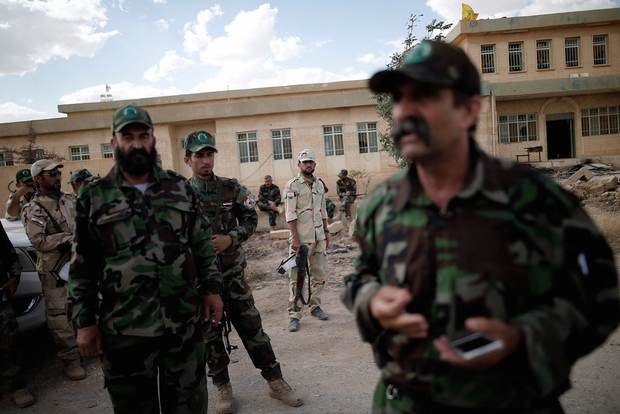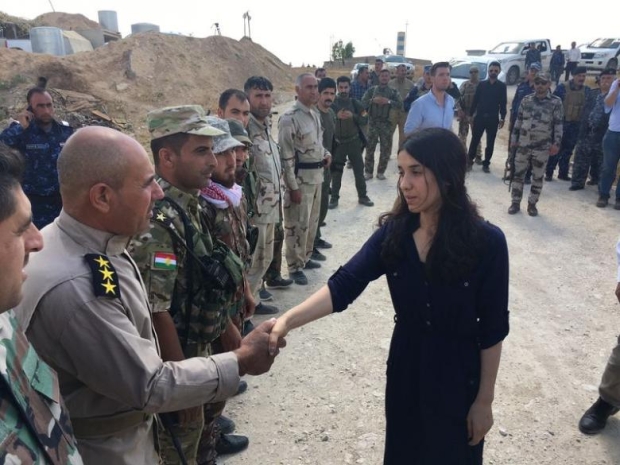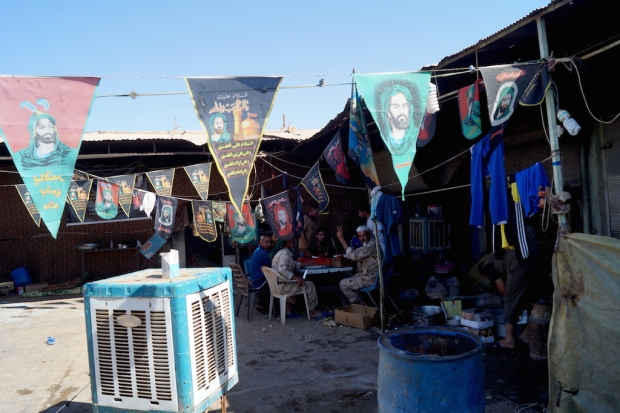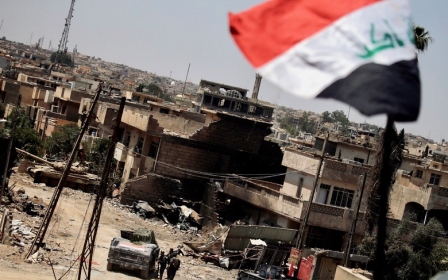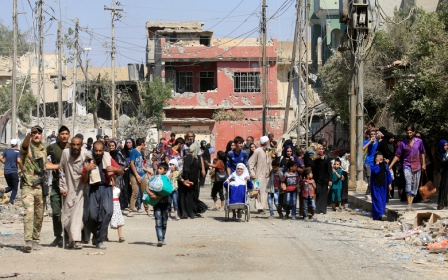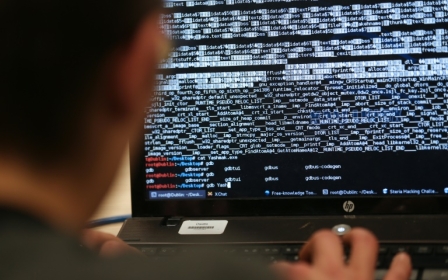'After IS something will happen': Fear of conflict among victors in Kurdish Iraq
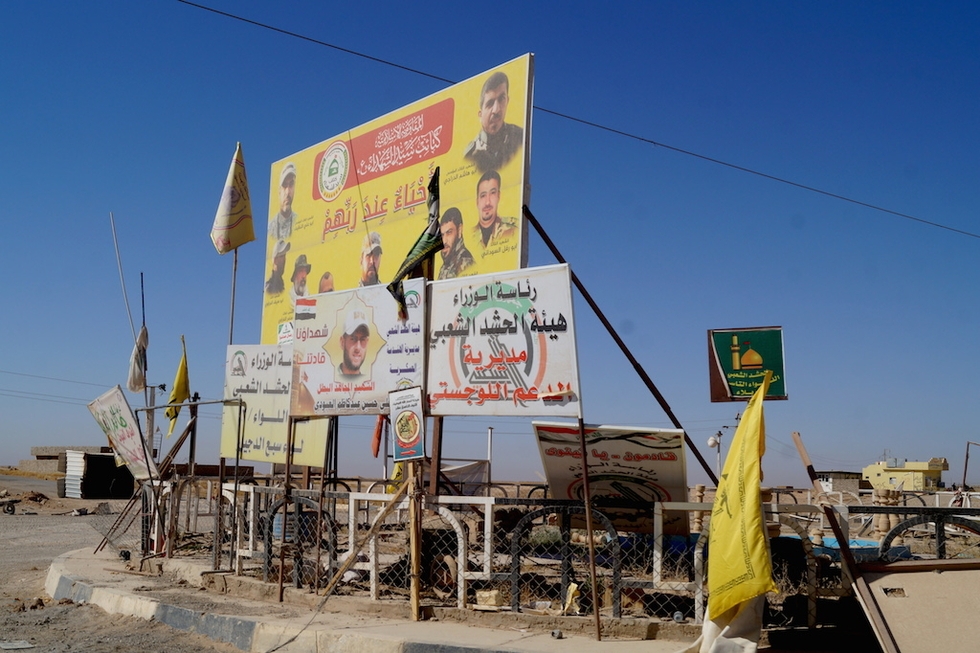
Near the village of Kojo, where the Islamic State group massacred hundreds of Yazidis in August 2014, new billboards are replacing the black banners of IS - that of the Shia paramilitary Popular Mobilisation Units (PMUs). The PMUs, many of which are Iran-backed, are now on the borders of the territory that the Kurds want to include in a future Kurdish state.
One billboard shows a picture of Iran’s supreme leader Ali Khamenei.
“Send my greetings to the mujahideen [Islamic warriors] of Hashd al-Shaabi [PMUs] one by one,” reads the text, next to a building with a black IS flag on it crossed out with red graffiti.
Despite the Iran references, PMU fighters are keen to emphasise that they are an Iraqi force.
In late May, the PMUs entered Yazidi areas that the Kurds consider theirs, in the northern province of SInjar. This has raised fears about the possibility of a civil war between the different competing factions in the area.
While the Kurdistan Regional Government (KRG) is backed by Turkey, the PMU forces receive the backing of Iran. A potential fight could threaten stability in the areas currently disputed between the Baghdad government and the Kurds, following the assumed defeat of IS in Mosul.
Especially due to the fact that the Kurds are planning to hold a referendum after IS's presumed defeat in Mosul this summer. There were already several brief clashes between the Kurds and the PMUs in the town of Tuz Khurmato in 2015 and also in 2016.
A new army
Many of the PMUs were created in June 2014 after an edict by the Shia religious leader Ali al-Sistani calling on Iraqis to protect Baghdad after IS took Mosul. Shia armed groups existed before 2014 and even fought the Americans during the occupation, but now they have become much stronger and look more and more like an organised army.
“We are not like a militia anymore,” one PMU member told Middle East Eye.
The PMUs are recognised by Baghdad, receive salaries, have their own tanks, heavy weapons, and are backed by the Iraqi air force.
'Sinjar is ours, it’s our people, we are going to move and push [against the Peshmerga] there'
“It was necessary to come here, otherwise IS would control all of Iraq. It would expand [from the Sunni areas],” Hamza Hussein, a PMU fighter, told MEE.
“We want to protect the Yazidis against Daesh. We don’t recognise any differences between groups. Yazidis, Sunnis, and Shia, for us the priority is innocent civilians,” he said.
There were already problems between the Kurdish factions in the past over territorial control in Sinjar, mainly between forces allied to the KRG and forces linked to the Kurdistan Workers Party (PKK), primarily the Sinjar Resistance Units (YBS).
This led to clashes on 3 March that killed at least seven pro-PKK fighters. But now the situation is even more complicated with the arrival of the PMU forces, which could hurt the future rebuilding of Sinjar.
Already the tensions between the KDP and the PKK have prevented the return of thousands of Yazidi internally displaced persons (IDPs), who preferred to stay in IDP camps in the Kurdistan region.
Nadia Murad, a former Yazidi captive of IS and Nobel Peace Price nominee, expressed her worries about the future of her region.
“Our fear today is that the Yazidi homeland in Sinjar will be divided into three or more regions and the opposing factions will fight for control on our land – not to advance the dignity of our people,” she stated after her village was liberated from IS by the PMU on 25 May.
Some of Nadia’s brothers and hundreds of other Yazidis have already joined the PMUs, challenging Kurdish control over the disputed territories.
Kurdish Peshmerga forces took back Sinjar city from IS in November 2015, one year after Kurdish Peshmerga forces withdrew from Sinjar, leaving the Yazidis to the mercy of IS.
This withdrawal allowed the PKK to establish a presence in Sinjar from Syria, opening a corridor that saved hundreds of Yazidis, including a number of KDP forces.
But now the PMUs are challenging both the PKK and the KDP over control of the Yazidi homeland. Many Kurdish Peshmerga fighters and Kurdish civilians think there will be definitely a war with the PMU forces over territory after IS is finished.
“We hope that after they liberate the area, they give it back to us,” Qassim Shesho, the head of Yazidi Peshmergas in Sinjar told MEE by phone. “Of course there are going to be problems. No matter if it’s the PKK, Hashd [PMU], or the KDP, these three forces cannot work together, and it will be a problem for people to go back to their homes among all these tensions."
'We will take Sinjar'
Naif Jasso, a former Peshmerga, with a traditional Yazidi moustache, sits in his base in the Yezidi village of Tel Qassab, and is surrounded by dozens of curious Yazidi fighters plus a media team of the PMUs that insist on recording the interview on tape. He is the new vocal head of the Yazidi brigade backed by the PMUs that sees both the KDP and PKK as "foreign" and wants to push both out from the territory of Sinjar.
'We are going to get more support [from the PMUs], tanks, weapons, mortars, training, everything'
- Naif Jasso, leader of Yazidi PMU-backed brigade
He is convinced that in the future Sinjar will fall under Baghdad’s control, and will not become part of a Kurdish state.
“We don’t want other people to be involved in Sinjar, not Peshmerga and PKK, they are Kurdish forces, only Yazidis as an independent force are allowed in Sinjar,” Jasso said.
He says he now commands over 1,000 Yazidi fighters, but plan to recruit over 20,000.
“We are going to get more support [from the PMUs], tanks, weapons, mortars, training, everything,” he said.
“The game of the Peshmerga [KDP] is finished, they cannot stop the Yazidis coming to us. Sinjar is ours, it’s our people, we are going to move and push [against the Peshmerga] there,” he said.
A PMU logistics base in the village of Tal Ata is covered with flags with the face of Imam Ali. Shia regard Ali, the son-in-law of the Prophet Muhammad, and the prophet's grandson Hussein as his true successors.
Just as some Kurds are hostile towards the PMUs, the Shia fighters are hostile towards the Peshmerga forces. They especially hate the Kurdish president Barzani.
“Barzani is a terrorist, Barzani brings terrorists to here from the border,” Saeed Hameed, a PMU fighter from southern Iraq said. “We are not going to allow them to make another country."
He warned that there was going to fighting.
“Yes, between Arabs and Kurds, Massoud Barzani hates Hasdh Shaabi [PMU],” the fighter said.
Qasim Musla, a brigadier general in the PMU forces on the frontline also says that they will not allow the Kurds to have their own state.
“We are not going to accept the Kurds to separate from Baghdad,” he said. “But when anything happens, we wait for orders from Baghdad and the religious authorities,” he said.
“Everybody knows after IS something is going to happen, something is going to ignite this fire. There might be a war between Sunnis, between Shia, between Kurds and Sunni, and maybe between Baghdad and Kurds. All of this is expected."
“The reason is that the Americans, Saudi Arabia, Qatar are involved in Iraq. But we have good people who understand the situation and the marjiya [Shia religious authorities]. Hopefully this is not going to happen."
Conflicting agendas
One week ago, the leadership of the Peshmerga forces warned the PMUs that "no force can or has the right to enter Kurdistan territory" and that any force that tried to enter "Kurdish territory will beat their heads against the mountains of Kurdistan."
Nevertheless, some cool-headed Peshmerga commanders, such as Serbest Lezgin, who leads the Peshmerga forces in Sinjar, think it's unlikely there will be problems.
'The Sinjar people must govern their area, and decide about their future'
- Masrour Barzani, chief of security, KRG
“If the Hashd don't come to Peshmerga territory, and don’t cross our lines, I doubt we will have a problem,” he said. There were already talks to prevent more tensions. Last Sunday, the Kurdish intelligence and security chief Masrour Barzani met with the Iraqi Prime Minister Haider al-Abadi in Baghdad to discuss the joint fight against IS.
“We have no problem with them [PMU], they fight ISIS, and we respect their losses,” he added.
“But they have their own agenda, and Kurdistan has also its own agenda. Sometimes there are contradictory statements by the Hashd commanders, some say they want to go fight in Syria. They have their own agenda, and we have nothing to do with that."
“I think eventually the problems will be solved. The Sinjar people must govern their area, and decide about their future,” he said.
Families divided
Matthew Barber, an American expert on the Yazidis, also doubts that the Shi’ite PMU and Kurdish Peshmergas forces want to fight each other.
“I don't believe that either the PMU or the KDP will want to shoot first. Both groups know that hostilities could get ugly. If the PMUs stay put in the southern Yazidi towns, and the KDP stays within the areas that it already controls [in Sinjar and north Sinjar], I doubt that either side would make a first move and attack the others,” he said.
“Still, the KDP will resent the PMU presence: the PMU now controls what were the largest Yazidi population centers on the south side of the mountain (pre-genocide). That is a lot of important territory to control - the entire southern half of the Sinjar Region."
“Yazidis don’t want to fight other Yazidis,” he said. “Many families contain members who belong to both groups - from a single family, some brothers are in the Yazidi Peshmerga, while others belong to the PMUs."
Nevertheless, it remains to be seen if both forces can prevent another war, with both sides expecting clashes to happen any time after IS is defeated.
Middle East Eye propose une couverture et une analyse indépendantes et incomparables du Moyen-Orient, de l’Afrique du Nord et d’autres régions du monde. Pour en savoir plus sur la reprise de ce contenu et les frais qui s’appliquent, veuillez remplir ce formulaire [en anglais]. Pour en savoir plus sur MEE, cliquez ici [en anglais].


